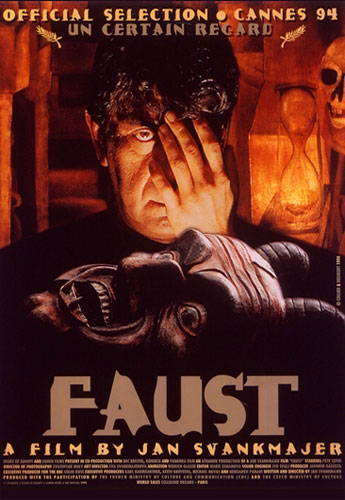- Faust (1994 film)
Infobox_Film
name = Faust

imdb_id = 0109781
writer =Jan Švankmajer
starring =Petr Cepek Jan Kraus Vladimír Kudla Antonin Zacpal
director = Jan Švankmajer
producer =Jaromír Kallista
distributor =
released =September 10 ,1994
runtime = 97 min
language = Czech, Latin
amg_id = 1:133792
budget =Jan Švankmajer 's film "Faust" was made in theCzech Republic in 1994. It merges live-action footage withstop-motion footage and includes imaginativepuppetry andclaymation . The Faust character is played byPetr Čepek . The film was produced by Jaromír Kallista. Although the film does not serve to accurately portray theFaust us legend, it utilizes the legend in a rather imaginative way, borrowing and blending elements from the story as told byGoethe andChristopher Marlowe with traditional folk renditions. It has a distinctly Modernist, Absurdist, Kafkaesque feel, especially with the setting in Prague. The tone is dark but humorous. The voices in the English version were provided byAndrew Sachs .ynopsis
The story commences on the streets of
Prague on a very ordinary grey morning with commuters bustling about. We are introduced to the figure of anEveryman , played byPetr Čepek , a rather colourless figure emerging from a metro station. On his way home, the man encounters two men handing out flyers, one of which he takes. It turns out to be a map of the city with a location marked in. He shrugs and discards it. He returns to his rather dilapidated tenement building. As he is opening his mailbox, he sees a mother and child walking out of the building dragging adoll behind them. He goes up to his lodging and opens his door, releasing ablack cockerel that runs down the stairs. Entering, he sits down to eat, cutting himself a slice of bread. He discovers an egg concealed inside the loaf and extracts it. He cracks it open but it is empty. As it breaks, the lights go out and the wind rises. Objects are thrown about the room. The commotion ceases and the man goes to the window and looks down to where the two men from earlier are staring up at him with whitened eyes. One of them holds the cockerel. He closes the blind and returns to the table, where he finds the map and, using his own map of the city, traces out the location marked.The next day, he goes to the spot indicated and enters a large darkened building from which a man rushes in apparent fear. The man presses on into the interior and descends to a dressing room, where he finds a charred script, a robe embroidered with
sigils , greasepaint, a wig and beard and a cap. Sitting down he arrays himself asFaust and speaks to himself, (the first words spoken in the film) Faust's opening declaration of intent to follow black magic. A stage light begins to flash and a buzzer sounds indicating ‘actors onstage’. Faust rises and makes his way through the backstage area, past a dressing room full of shrieking chorus girls and a restingmarionette to the stage. He peeps through the closed curtains and sees an audience assembling. Struck with stage fright, he pulls off his costume and wipes off his makeup. Looking around, he sees various theatrical stage-hands who regard him in a challenging way. He looks for a way to escape, opens his clasp knife and cuts and exit through the cardboard backdrop to find himself in the darkness of a Gothic vault. He walks on until his come to an alchemist's laboratory, with alembics, bottles, skulls, candles and agrimoire . He opens the stove and blows the embers under a large retort. They flare up and he leaps back. The liquid in the retort starts to bubble. Insects, birds skeletons scuttle over the table as the liquid thrashes about, eventually resolving itself into afoetus , then a child. The man smashes the retort and carries thehomunculus to the grimoire. Writing magicsigils on a piece of paper, he fold it and, using his knife, inserts it into thegolem 's mouth. The clay child awakes and sits up, looking around. The child's face morphs three times first into a boy's, then into the face of the man (the protagonist himself), then into a mocking, laughing skull. The man becomes angry (for being reminded of his eventual death) and crushes the clay figure, who only 'dies' after he retrieves and tears up the magic paper.A stage backdrop falls from above. Then descends a huge wooden
marionette of a goodAngel who proceeds to warnFaustus from practicingblack magic . The angel departs. There is a clap of theatrical thunder and the head of aDemon is seen rolling down a mountainside to take the stage. Thedemon exhorts Faustus to practice black magic. The fiend departs. A servant enters and tells Faustus that two men are waiting outside for him. Faustus rises and leaves. AFool enters and begins reading Faustus’ grimoire. Faust leaves through the exit door, which leads to a small tavern. There he sits down with the two men for a drink, although none of them engage in any conversation and rarely make eye contact. One of the men slides the everyman a bag from underneath the table which contains acat of nine tails , an incense lantern, a robe, and a magic circle. Back at the stage, the jester is having difficulty understanding the grimoire, and so he sits on it, explaining "that the things his poor brain can't comprehend...may do better in the other end!"External links
*
Wikimedia Foundation. 2010.
